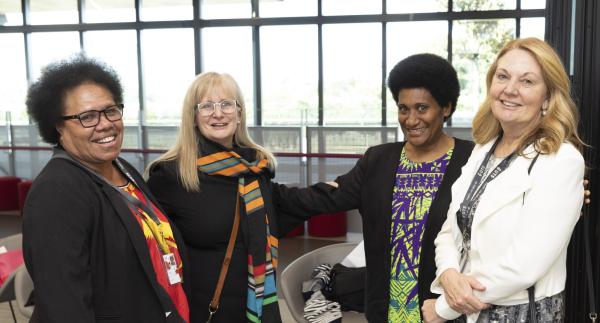Our centre’s work spans across education, training, policy and monitoring, evaluation, research and learning.

Overview
Underpinned by co-designed collaborative research projects
We ensure the work we undertake is representative and relevant to the needs of our partners.
With experts spanning nurses, midwives, and health and policy researchers, we take a whole-system approach to ensure that nurses and midwives across the region possess adequate education, skills, and training. Our work not only aims to upscale, but also to ensure these sectors are supported by strong regulation and policy to enhance health development.
All our work encompasses a mix of research, monitoring and evaluation and application with projects developed collaboratively with partner organisations in countries throughout the pacific region.
Our work broadly falls under the following areas.
Leadership
We conduct research into how current national and regional leadership bodies are addressing the needs of nurses and midwives on all levels. With this evidence, our centre strives to build leadership capacities and capabilities in-country by co-designing educational materials, curriculums, and evidence-based training across all levels of the health ecosystem.
Jobs
Our regional collaborations allow us to research the dynamics of the nursing and midwifery workforce to better understand our colleagues’ unique needs. Our research seeks to understand the perceived value of nursing at a local level, and how this impacts jobs and movement of workers. This research aims to find ways of creating more robust policies, frameworks and codes in which governments and workers will support.
Education
Our centre works with an array of organisations to assess emerging needs and gaps in nursing and midwifery skills in the region. Our aim is to build the capacity of in-country educators and the facilities they use, to enable them to carry out adequate nursing and midwifery education. This certifies sustainable and ongoing program delivery in each country, empowering their leaders to create a better health workforce. We ensure any educational changes are in line with the country’s needs by conducting gap analysis, scoping reports, and monitoring and evaluation throughout each project.
Service delivery and regulation
Our centre works with governments to evaluate, develop, and strengthen regional accreditation systems, ensuring they reflect the needs of individual countries. Our work in this area is intrinsic with local governments, as having robust, practical, locally relevant policy enables governments to regulate the sector more efficiently. Better regulation leads to a high quality, consistent model of care, ensuring both population health and the health workforce are well protected. It also ensures we work towards the WHO Strategic Direction for Service Delivery 2021-2025.
Maternal and Child Health
Maternal and child health is one of the Pacific region’s greatest health issues. Particularly, Papua New Guinea has the world’s third worst maternal mortality rate. These issues are compounded by challenges in regulation and lack of access to trained health professionals. Our centre takes a whole-system approach to address these challenges in each country context, aiming to improve maternal and child health throughout the region. Our work focuses on combining training, policy and regulation development, education, and research upscaling, all of which are used to inform government decision making.
